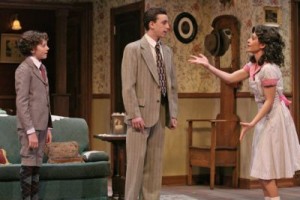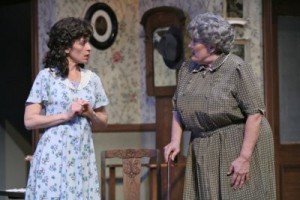
If anyone is wondering why Neil Simon’s Lost In Yonkers won both the Tony Award for Best Play and the Pulitzer Prize for Drama, head over to the La Mirada Performing Center For The Arts. The McCoy Rigby Entertainment production of this Simon favorite is a textbook example of how to make an 18-year-old comedy seem as fresh as if it were only now getting its world premiere.
The recipe for success?
1) Hire a director who knows the play like the back of his hand (Jeff Maynard played the role of not-quite-sixteen Jay in the First National Tour, which I saw at the Doolittle Theatre in 1992).
2) Cast actors who are for the most part only now discovering Neil Simon’s greatest comedy.
This combination of experience and freshness works wonders.
Michelle Azar (Bella) had only last September read the play for the first time, and though Jayne Taini (Grandma) had always wanted to do a Neil Simon play, the role of the heart-of-ice matriarch had not been high on her radar. As Jay and his 13½-year-old brother Artie, just-turned-16 Aaron Albert and 12-year-old Austyn Myers were too busy performing (and studying) to have had time to familiarize themselves with the Simon oeuvre. With Kevin Weisman (Louie), Evan Arnold (Eddie), and Jennifer Parsons (Aunt Gert) completing the cast, the result is a production which pays respect to the play’s origins and gets all the requisite laughs (and tears), yet features performances which give each of the play’s beloved (and not so beloved) characters whole new shadings and colors.
For those not familiar with Simon’s seminal dramedy, Lost In Yonkers recounts the ten months young Jay and Artie spent with ditzy Aunt Bella and their German-Jewish “grandmother from hell.” The year is 1942, the world is at war, and the brothers have recently suffered the loss of their mother to cancer, an illness which has left their dad, Eddie, severely in debt to a rapacious loan shark. Dad’s solution (to head south and earn enough money to pay off his debts) means leaving his two teens behind with Grandma The Hun.
Grandma Kurnitz suffered a foot injury as a child and since then has walked with a multi-purpose cane, just right for administering punishment to a disobedient child. Reveals Jay, “Pop said she could swing her cane so fast, she could have been one of the greatest golfers in the world.” Oldest son Louie works as “some big mobster’s henchman,” which Artie at first confuses with “hunchback” until Jay corrects him. Daughter Gert has a unique speech defect; she says the first half of every sentence breathing out and the second half sucking the air back in. (“I once saw her try to blow out a candle,” says Jay. “Halfway there she sucked it back on.”) Finally, there’s Bella, whom Jay describes as “a little closed for repairs.” When Artie wonders about Aunt Bella’s education level, Jay informs him that she did go to high school … a little, but “she missed the first year because she couldn’t find it.”
Lost In Yonkers adroitly balances a trio of plots—Jay and Artie’s attempt to survive a year with “Frankenstein’s Grandma,” Bella’s wish to marry a movie usher named Johnny (contingent on getting her mother to give her $5000 so that Johnny can open a restaurant), and the surprise visit of Uncle Louie on the lam from the mob.
For those expecting Simon’s trademark one-liners, there are many of those. When Arty asks Bella what movie she’s just seen, she replies, “I don’t know. I couldn’t find the theater I was looking for, so I went to the one I found.” Later, the preteen asks his aunt if it’s true that Grandma is partly deaf. Bella’s response? “Oh sure. But the other part hears perfectly.”

What sets Lost In Yonkers apart from the rest of the Neil Simon oeuvre is its cast of characters, including arguably the two most complex and multilayered women the master playwright has ever created: Grandma Kurnitz and Bella. Add to that a pair of very real adolescents, a father who would sacrifice pretty much everything for his family, a low-level gangster uncle, and an aunt with a speech impediment slash emotional scar and you’ve got seven of the best Simon characters you’ll likely ever see on stage at once.
Both Bella and Grandma are tough nuts for an actor to crack. The danger is to make Bella too “comedy dumb” and Grandma too “one note.” Azar and Taini avert these dangers with flying colors.
Azar’s Bella, while still getting laughs galore with the character’s off-beat remarks, is firmly rooted in reality. When she stomps out of the room in a huff, simply because Artie doesn’t want her to make him a sundae “right now” but “maybe later,” it provokes both laughter and shock. This seemingly harmless child in a woman’s body is a potential loose cannon and someone not to cross. Later, when Bella pleads in front of her whole family for Grandma to agree to her marrying a theater usher she’s fallen for, Azar holds back the sobs that sometimes accompany the scene, but her performance is no less effective for her restraint.
As for Battle-ax Grandma, Taini takes a chance and plays her as a woman who still retains some very slight traces of the person she once was. This is a more three-dimensional Grandma than usual, one who even (and I’ve never seen this before) cracks a secret smile when playing one of her ostensibly “cruel” jokes on her grandsons. (She has a habit of hiding a jar of pistachio nuts for sale in her candy shop, then charging a young family member working in the shop for the theft, saying, “You’re responsible if somebody steals from this store. Even me.”) Taini’s Grandma seems to be enjoying the joke. Nevertheless, when Grandma finally breaks down, in Taini’s gifted hands the moment is both heartbreaking and absolutely real.
Like the role of Bella, those of Jay and Artie took director Maynard quite some time to cast. (Azar, Albert, and Myers’ names did not appear in the original press release.) The director wanted child actors who were absolutely right for the roles, boys who wouldn’t play cutesy, boys who would be 100% real, and in Albert and Myers he hit the jackpot. Besides being almost exactly the ages of their characters, these two very young theater pros are never anything less than believable, and the laughs they get are all the louder for being reality-based.
Weisman is a standout as tough guy Louie. As a child, the actor would pretend to be James Cagney (there is a distinct resemblance between the two), and without being in any way a caricature, Weisman’s performance had me thinking of the film legend only moments before Arty quipped, “He’s incredible. It’s like having a James Cagney movie in your own house.” Louie is a great character, who adds his special brand of bravado and charisma to Grandma’s household whenever he visits, and Weisman does him absolute justice.
Arnold’s pair of book-ending scenes as Eddie, the boys’ dad, are beautifully played, revealing the pain behind Eddie’s smiling assertions that the boys will do just fine with Grandma. This is a man who has known his fair share of suffering … and one who is not afraid to cry, but one whose strength and love are the glue holding his fragile family together.
Finally, there is Parsons’ stealth bomb of a performance as speech-challenged Aunt Gert. Gert’s affliction is usually played just for laughs, and truth be told, her habit of inhaling the second half of her sentences has never before seemed to me to be anything but a gimmick … until Parsons. Exquisitely underplaying the role, Parsons shows us a woman who is walking wounded, and when she sucks in the air halfway through any sentence longer than five or six words, you truly feel that it’s because there’s no more air in her lungs, that she’s literally gasping for life. And in case you worry that this more realistic approach to Gert makes her any less funny, fear not. Parsons makes her hilarious.
Besides casting a superb bunch of actors and bringing his personal experience and expertise to the job of director, Maynard and the McCoy Rigby organization have surrounded the Lost In Yonkers cast with an equally stellar design team. Scenic designer John Iacovelli’s 1942 Yonkers apartment and Dwight Richard Odle’s WWII costumes are richly detailed and period perfect. Kudos also to Craig Pierce’s lighting and Josh Bessom’s sound design.
Whether, like me, you’ve seen and enjoyed Lost In Yonkers numerous times before, or whether this is a Neil Simon play you’ve yet to discover, the La Mirada production is one you’ll want to see, and tell friends about. Revivals don’t get better than this one.
La Mirada Theatre for the Performing Arts, 14900 La Mirada Boulevard, La Mirada.
www.lamiradatheatre.com
–Steven Stanley
February 10, 2009
Photos: Michael Lamont



 Since 2007, Steven Stanley's StageSceneLA.com has spotlighted the best in Southern California theater via reviews, interviews, and its annual StageSceneLA Scenies.
Since 2007, Steven Stanley's StageSceneLA.com has spotlighted the best in Southern California theater via reviews, interviews, and its annual StageSceneLA Scenies.







 COPYRIGHT 2024 STEVEN STANLEY :: DESIGN BY
COPYRIGHT 2024 STEVEN STANLEY :: DESIGN BY